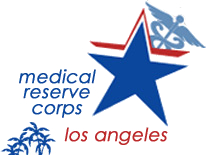History of the MRC
Read the MRC Director’s Message
In the wake of September 11, America was forced to confront the fact that, while we have thousands of individuals who generously volunteered their efforts to help save lives, the infrastructure was embarrassingly nonexistent.
In some instances, it caused more harm than good; while unable to provide effective aid due to the lack of organization, they nevertheless required food and housing, adding an unnecessary burden to the officials.
At the beginning of 2002, President Bush addressed the nation, urging all citizens to support their country by offering their volunteer services to their community. In response, the national Medical Reserve Corps (MRC) was established in July of 2002 under the Surgeon General’s Office. In recent years, the national Medical Reserve Corps program was moved under the Assistant Secretary of Preparedness and Response.
This national MRC program serves as the underlying support for the localized community efforts, offering information and strategies, as well as technical assistance. Nearly all of the states have an MRC and thousands of individuals have signed up or expressed interest in volunteering.
The MRC is a national network of local volunteers units, focused on strengthening the health of their communities by donating their time and expertise to prepare for and respond to emergencies, while promote healthy living throughout the year.
MRC units improve the health and safety of communities across the country by organizing and utilizing public health, medical, and other volunteers to support existing local agencies throughout the year and in times of need.
A goal of the MRC is to identify, credential, train, and prepare members in advance of emergencies. Although MRC units are principally focused on their local communities, it is clear that in a statewide or national disaster, MRC volunteers could be vital to the success of the response efforts. The MRC volunteers supplement existing emergency and public health resources.
MRC is a partner of the White House’s USA Freedom Corps and the Department of Homeland Security’s Citizen Corps. Citizen Corps, AmeriCorps, Senior Corps, and the Peace Corps are part of the President’s USA Freedom Corps, which promotes volunteerism and service nationally and internationally.
MRC and ESAR-VHP each represent key national initiatives of the U.S. department of health and human services to improve the nation’s ability to prepare for and respond to public health and medical emergencies.
There are approximately 1,000 registered MRC units nationally. This translates to about 200,000 MRC volunteers. The national Medical Reserve Corps functions as a home base for the MRC units by offering online trainings, best practices advice, annual leadership conferences, and more.
They also coordinate efforts between the local, state, regional, and national organizations and agencies that would help communities achieve their local visions for public health and emergency preparedness.
Visit the California Disaster Healthcare Volunteers Website to register as a volunteer for MRC Los Angeles.
